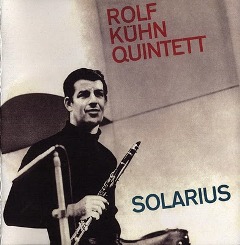Rolf Kuhn Quartet – Solarius (1964)
Rolf Kuhn Quartet – Solarius (1964)

1. Minor Impressions (R.Kühn) 07:56 2. Solarius (R.Kühn) 06:15 play 3. Sie gleicht wohl einem Rosenstock (Volkslied) 06:29 4. Mountain Jump (J.Kühn) 06:35 5. Lady Orsina (R.Kühn) 06:22 6. Soldat Tadeusz (J.Kühn) 06:40 Rolf Kühn, clarinet Michael Urbaniak, soprano & tenor saxophone Joachim Kühn, piano Klaus Koch, bass Czeslaw Bartkowski, drums Recorded in Berlin (East), DDR. Track 2,3,5 and 6 on 29th November, 1964. Track 1 and 4 on 30th November, 1964
Over the years this album achieved a legendary status and became a highly sought after collector's item, because of its political implications, as well as being one of the earliest East European Jazz recordings and an important cornerstone of European Jazz in general. The album was recorded three years after the Berlin Wall, which divided the city until 1989, was constructed and served during that period not only as a symbol of division of Germany into two separate States living in a constant state of political tension, but in fact also as a symbol of the imaginary Iron Curtain, which divided the European Continent into two opposing political camps, engaged in the Cold War, which periodically threatened to become "hot".
Rolf Kuhn left East Germany (or DDR as it was called at the time) in 1950, shortly after Germany was split into two separate states, and moved to West Germany. For several years he lived and performed in the USA, establishing his position as one of the top clarinet players in the world. Upon his return to West Germany he continued his prolific career. Meanwhile his younger brother Joachim Kuhn lived in DDR and led his own trio, which was a pioneering Free Jazz outfit at the time.
The fact that the meeting of the Kuhn brothers captured on this album happened is one of those "against all odds" situations that often happened in East Europe. This was by all means a meeting of the Giants of East European modern Jazz, with Urbaniak arriving from the legendary Krzysztof Komeda quintet, Bartkowski from the no less legendary Zbigniew Namyslowski quartet, Koch who played in the Joachim Kuhn trio and finally the two brothers, who despite the age difference are true musical twins.
Together the quintet plays some of the best modern European Jazz ever captured on record, with great melodies expanded into lengthy solos played perfectly by all the musicians involved. Listeners familiar with the Polish Jazz scene will find this music quite similar to the Komeda and Namyslowski albums receded around that time, which present the same formula and even sound very similar to this album. Rolf Kuhn plays some of the best Jazz clarinet ever and no true Jazz connoisseur can honestly afford not to have this album in his collection.
The rapport and incredible telepathic communication between these musicians, as well as the incredibly tight musical environment that pushed the players to their limits resulted in one of the all time best Jazz albums recorded in East Europe, which lost absolutely nothing of its beauty and incredible power in the five decades that passed since. They don't make music like that any more, which means this is an absolute must and an essential piece of music history!
Side Note: As all the East European countries under the Socialist regime, East Germany, or DDR as it was known at the time, had only one state owned and controlled Music Company, which released most of its productions on the Amiga label. Among the many Amiga releases the legendary "orange J" series was dedicated to Jazz recordings, many of which were licenses from the West, but others were original productions, mostly of Jazz made in DDR. Some of these releases, like the one described above, were absolute gems. Following the unification of Germany, the Amiga albums disappeared from the face of the earth and only in 2012 a German label reissued 15 Amiga Jazz albums on CD. They are all worth checking out! ---Adam Baruch, http://polish-jazz.blogspot.com
download (mp3 @320 kbs):
Last Updated (Saturday, 10 March 2018 23:31)








